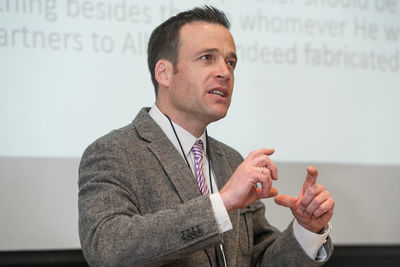 Gabriel Said Reynolds, Notre Dame professor of Islamic studies and theology
Gabriel Said Reynolds, Notre Dame professor of Islamic studies and theology
The Qur’an describes God as a god of mercy. The Qur’an describes God as a god of vengeance.
Are those qualities mutually exclusive? Gabriel Said Reynolds doesn’t think so.
The Notre Dame professor of Islamic studies and theology is using a fellowship from the National Endowment for the Humanities to explore the idea. He’s spending a year researching the way the Muslim holy text juxtaposes narratives of God’s destruction with declarations of God’s compassion.
Those parallels, he contends, reveal deep insights on the theology of the Qur’an—and indicate how it is in conversation with Jewish and Christian theology.
“Western scholars have often examined the stories of divine punishment in the Qur’an as a rhetorical strategy or method of persuasion by the prophet Muhammad,” Reynolds said. “But they’ve been so interested in these questions that they’ve ignored the theological problems in the Qur’an’s insistence on God’s mercy.”
Reynolds, who conducted research in Lebanon this summer and is spending the rest of the academic year at the Institute for Advanced Study in Nantes, France, has long been interested in the interchange between the Qur’an and the Bible.
In his 2010 book, The Qur’an and its Biblical Subtext, he argues that the Qur’an is constantly interacting with the biblical tradition, and in many ways depends on the biblical knowledge of its audience. There, he uses primarily narrative examples—such as the stories of Noah, Lot, and Jonah—while his latest research focuses on theological reflections in both sacred texts.
“When it comes to discourses about God, is the Qur’an also in conversation with the Bible?” Reynolds said. “My hunch is that it is, and I will be trying to prove that case.”
Originally published by Josh Weinhold at al.nd.edu on November 1, 2016.